- Home
- Vicki Delany
Whiteout Page 9
Whiteout Read online
Page 9
She wanted to explore a different route this morning, so instead of continuing along the main road she turned off and skied down a small path cutting through the woods to another lake. This was a summer road, not plowed in the winter. The snow was thick and heavy under her skis but the absolute quiet and the splendor of open blue sky and sun shining on pristine snow was well worth the extra effort.
Joanna delighted in her surroundings. It was the dream of her life to come back up north, and now at last she was here. When she was young her parents owned a cottage on Lake Rousseau, in the very heart of Ontario cottage country. She remembered idyllic summers filled with dives off the dock, long swims as the melting sun turned the water orange, roasting hot dogs and dripping marshmallows over a roaring bonfire down by the water and lazy boat rides just to see what was happening on the rest of the lake. But one day it ended, as she came to believe that all good things must end, and her beloved father was killed in a freak water-skiing accident when she was thirteen. The driver of the boat had consumed far too many martinis, but no one worried much about that sort of thing, whether boating or driving, in those days. Showing off to the waving admirers standing on the dock, he veered too close to the shore. Joanna’s dad crashed into the lowlying rocks hugging the water’s edge, and flew into the dock headfirst.
Fortunately, he had barely enough life insurance that Joanna’s mother was not forced into the uncomfortable position of destitute widows everywhere, to look for work for which she had no skills, no aptitude and no training. But she sold the family cottage to the first person that made an offer, and soon after that the large comfortable home in upscale Forest Hill. Joanna didn’t mind the move to a small bungalow in the suburbs, but the loss of the cottage was like her father’s death all over again. When she was young she was angered beyond reason at her mother’s refusal to accept kindly extended invitations by close friends and relatives to spend weekends at their cottages. But with insight that only arrives with maturity, after years of anger she was able to recognize her mother’s aloofness for what it was. Returning to the lakes would have been just too painful, too much a reminder of all that was lost, so she preferred to spend the summer in the sweltering city. The children were packed off to day camp, and sent swimming in the over-chlorinated, overcrowded town pool on the weekends. Now that it was much too late, Joanna wanted to tell her mother that she understood.
The road wasn’t long and ended abruptly at a small summer cottage sitting high on a rocky hill overlooking the lake. She skied over to the edge. The lake lay beneath her, an unbroken stretch of snow reaching to the hills beyond. Not a single footprint or the marks of a snowmobile broke the surface.
She pulled off her skis and settled comfortably onto a rock to eat her snack before heading home. A chipmunk ventured out from behind a tree, wiggling its nose timidly at the sight of food. Joanna broke a small crumb off her sandwich and held it out to him. “Come and get it.”
The little body quivered with excitement and the nose twitched furiously but the animal dared venture no closer.
“Very wise of you, I think,” she laughed, tossing the piece of bread onto the snow.
The chipmunk never reached his meal. It turned on its little heels and bounded back into the safety of the woods as a crash echoed from the cottage. More clatter broke through the silence of the woods, followed by the soft tinkling of broken glass.
Two figures jumped out of the cottage and ran up the road. Joanna crouched down closer to her rock, trying to make herself as invisible as the chipmunk. They were laughing wildly as they ran, zigzagging from one side of the clearing to the other. In each hand they held a bottle, liquor by the look of it. They were dressed alike in oversized winter jackets, one bearing the loud logo of the Chicago Bulls on the back, and both wore thick brown work boots and black woolen toques. All she could tell from her vantage point on the rock was that one was tall, the other very much shorter.
They didn’t look back and soon the wild laughter died away and Joanna’s heart returned to its normal rhythm. She left her skis and backpack at the top of the hill and walked cautiously up to the cottage.
It was similar to Scott’s cottage but smaller. A wide deck wrapped around the front of the building, overlooking the lake far below. Joanna climbed the steps and peered in through the large hole where a boarded-up picture window now gaped open. Shards of glass and chunks of broken plywood littered the carpet. The door of a small cabinet hung half off its hinges, revealing the rows of liquor and mix bottles filling the shelves. Joanna backed away quickly. She didn’t want to be here if they came back for a second load. Blowing snow drifted lazily through the broken window, a layer as fine as icing sugar already dusting the beautiful carpet.
Joanna grabbed her backpack and snapped her boots into the ski’s bindings. She traveled up the path at a steady pace, concentrating intently. She had no worries about rounding a corner and running into them, whoever they might be. Judging by the amount of noise they were making she would hear them long before they came into sight.
But she saw no one and made it home without incident, although she did travel much too fast for the comfort of her arm muscles.
She called the police, made a cup of hot chocolate and settled down to wait.
The police officer who arrived at her door less than a half an hour after her call was an older man, a few years short of retirement, with the vein-lined red nose and prominent belly that bore witness to many hours spent in the neighborhood bars and donut shops. He listened to her story thoughtfully, jotting down notes in a small pad as she spoke.
“Why don’t you come with me, ma’am?” he suggested. “They’ll be long gone by now, I don’t doubt. Then you can show me for yourself what you saw.”
Joanna again struggled into her heavy coat, scarf, mittens, boots and hat and rode in the cruiser with Constable Jenkins. As much as she liked winter, it was a chore getting dressed to go outside.
“Don’t get much vandalism up here,” he said. “Too far from the city, I guess. People feel pretty safe leaving their homes and cottages around here. This sort of thing gets people all upset.”
They were forced to leave the car at the top of the summer road and walked in. The tracks of her skis cut a good trail through the snow. Two sets of running footprints veered wildly down the lane. Dense, gray clouds replaced the pleasant sunshine of just a short while ago. The snow was falling faster and thicker as they walked.
“These tracks will be covered up pretty soon,” Jenkins observed, “but those look like pretty big boots. And I guess the ski tracks belong to you?”
Joanna nodded.
“Can you describe the people you saw?”
She thought for a moment. “Not very well. I only saw them from the back. They were all bundled up in the usual winter paraphernalia. I couldn’t tell anything at all about their shape. But one was a good bit shorter than the other. That’s it.”
“What sort of clothes?”
“Big jackets, with some kind of team logo on the back, jeans, black wool caps.”
Jenkins nodded at her story. Joanna felt inadequate, as if her description should be more concise. “I can’t tell you much, I spent most of the time trying to make myself invisible.”
The cottage was as she left it. Joanna waited on the deck while Jenkins climbed in through the broken window.
He examined the interior of the cottage quickly, then knelt down by the liquor cabinet to inspect the damage. In her first panicked look inside Joanna hadn’t noticed the piles of broken bottles littering the carpet in front of the cabinet. The nauseating smell of spilled booze filled the room and drifted out to reach Joanna on the deck.
“Quite a mess.” Jenkins hauled himself across the windowsill once again. “But looks like nothing else taken or broken. They were only after the liquor. Looks like they drank a fair bit of it as well. Though it’s hard to tell as so much soaked into the carpet. Could have been worse,” he said solemnly. “You were lucky they didn’t see
you.”
The walk back up to the main road and the cruiser was long and tense. The considerably overweight Jenkins huffed and puffed the entire way.
“I’m sure I would have been all right,” Joanna said, pulling her scarf tighter around her neck. They were walking into the wind this time; it bit savagely at her nose and cheeks.
“You never know with kids these days,” Jenkins said, shaking his head, “they can turn on you in a minute.”
“What makes you think they were kids? Isn’t that jumping to conclusions?”
“Who else would break into a place like this after the liquor? Sounds like the way these kids dress, too.”
“Lots of adults commit crimes as well, Mr. Jenkins. And everyone around here wears winter coats and jeans.”
“Still sounds like kids to me.” Jenkins hesitated before getting back into the car. “Let’s see where these tracks go.”
They followed the running footprints around the next bend. The snow was chewed up by the spinning wheels of a car.
“Too bad I didn’t get here sooner,” he said. “Looks like they had a bit of trouble getting their car out of this ditch. Well, they’re long gone now. I’ll put in a call for everyone to be on the lookout for a couple of drunken kids driving around, but I don’t think we’ll catch them this time. Nancy and Jack up at the store in town know most of the summer folk around here. They might have a phone number for the people who own the cottage. Someone had better call them to come up here and fix that window. Else they’ll have a place full of drunk mice and melting snow by spring.”
They rode back to Joanna’s cabin in silence. Jenkins let her out at the top of the driveway.
“Thanks for calling us, ma’am. I’ll let you know if we catch anyone.”
She got out of the car and was walking down the driveway when Jenkins called her back.
“Another thing, ma’am. I’d think twice about going out into these woods by myself if I was you. Anyone could be out there these days. You should ask your husband or a friend to go skiing with you next time.”
Joanna thanked him through clenched teeth.
“Ask my husband, indeed,” she marched into her home in a red rage. “Fat lot of good that would ever do,” she shouted to the uncaring wind. “I didn’t move all the way up here so I could cower under the covers waiting for the big, strong man to say I can go outside to play.” She slammed the door with such force that the windows rattled in agreement.
Chapter 10
As careful as she had tried to be, every muscle in Joanna’s arms and legs screamed their disapproval the next morning. She moved through the early day routine with care, grumbling to herself with every painful movement.
She turned on the shower and stood under the hot water, sighing with relief as the warmth cascaded over her aching body. All too soon the hot water turned cold and Joanna turned the taps off in annoyance. As she reached for her towel, the soap fell out of the little soap dish onto the shower floor. Before she could stop her forward movement, she planted a foot firmly on the slippery bar and plunged forward. She threw her arms out to protect her face and fell with the full weight of her body resting on her left hand, unfortunately the same spot that absorbed the tumble when she first arrived at the cabin. Her wrist took the full force of the fall and she landed heavily on her side. She gasped and gripped her hand, writhing on the shower floor. “Oh shit, oh shit. That hurts,” she shouted at the uncaring walls.
The shrill ringing of the phone broke through her moans of self-pity, then the answering machine picked it up.
“Mom, Mom are you there?” Wendy shouted into the phone after the machine had invited her to leave a message. “It’s seven o’clock in the morning-you must be there.”
“Yes, yes, I’m here. I was just in the shower.” Joanna held the phone in her right hand, jumping up and down as the waves of pain receded slowly from her left wrist. She gripped the phone, stark naked and dripping wet. She was freezing; the stove had not yet fully fired up to provide enough heat for the day.
“Oh, well, I won’t be long then. Are you all right? Your voice sounds a bit strained.”
“I was up late last night, working on a new piece, that’s all.” Joanna poked at the feeble fire, trying to encourage a few embers to respond with some sort of enthusiasm.
“I haven’t been up there to see your place yet. I would really like to. How about if I come up this weekend?”
“How would you get here, without a car?”
“I can borrow one from my friend, Marie. You haven’t met her, but she has the same faculty adviser as me and we’ve really struck up a great friendship. She hates Professor Blenkhorn as much as I do. I was telling her all about you moving up there to the back of beyond and she offered to lend me her car for the weekend. How about it?”
Joanna groaned inwardly. She would love to see her eldest daughter. But until she could ascertain the state of her wrist she didn’t want to risk Wendy discovering that she was hurt. “Not this weekend. I have a prior engagement. Sorry, dear. Maybe another time. How about next weekend?”
All Joanna could think of was that she was slowly freezing to death and she wished her arm would drop off. She didn’t hear Wendy struggling to keep the disappointment out of her voice. “Well, I’ll have to see if I can get the car then. I’ll call you next week. Bye, Mom.”
“Good-bye, dear.”
Joanna struggled to make her breakfast with the use of just one hand. She kept telling herself that she only needed a bit of time to let the wrist relax and it would be fine. She sat down to the computer to work but gave up after a few minutes of laboriously struggling to keep the left hand synchronized with the right.
By noon, it was getting increasingly hard to ignore the fact that, compared to the right, the left wrist bore a close resemblance to a watermelon. Joanna pulled over the thin phone book for Hope River and Environs, and looked up the number of the nearest doctor. It came as no surprise that there wasn’t one listed for Hope River. She eventually found a doctor in North Ridge who could see her that afternoon.
The town of North Ridge was about a half an hour of careful driving from Joanna’s cabin. It boasted a few more amenities than Hope River, including a couple of bars and a fairly elegant looking restaurant. She found the professional building without much trouble.
Doctor Richardson’s office was bright and modern. The waiting room was painted a fresh peach, with pale green furniture and good, cheerful prints decorating the walls. She happily lost herself in a stack of up-to-the-minute women’s magazines while waiting her turn.
With some disappointment Joanna tore herself away from an article on the fate of licensed day-care in Canada under the present government when the smiling receptionist called her name.
Doctor Richardson was young and attractive with an eager smile and an engaging chatty manner. She was surprised-most new doctors avoided remote rural practices like the plague, preferring the challenge and excitement of the big cities. He held her hand and manipulated her wrist carefully. A shiver dashed up her spine. Just the after-effect of the fall.
“A minor sprain, I’m afraid,” he said, smiling into her eyes. “But it will heal quickly.” He wrapped the offending appendage in a long bandage.
“How quickly?” she asked.
“Keep it fairly still for a couple of days and it will be right as rain before you know it.”
“I really have to use my left hand,” Joanna said, “all the time. I type on the computer. All the time.”
He looked at her intently. My, he has caring eyes, she thought. “A sprain like this can get worse, if you don’t give it a chance to get better.” He finished wrapping and released her hand. “Now, come back and see me in a week and I’ll check it out again.” He shook his finger at her. “But don’t let me find that you haven’t been looking after it.”
She smiled. For some strange reason her knees felt weak.
“You haven’t been in here before. Are you new to the area?�
�
“Yes, I am. I moved up here in September, from Toronto. I have a place just outside Hope River.”
“How are you liking it? Different from Toronto, isn’t it?”
Joanna had never been to a doctor before who asked her anything at all about her personal life. It was a nice feeling. “It certainly is. But I like my little cabin very much.”
“Me too,” he smiled at her. His teeth were amazingly straight and white. “I’ve only recently moved up here from Toronto as well. It seemed a great place to settle into a practice and raise a family.”
Joanna smiled back.
“My wife wasn’t too sure at first. But I think that she is beginning to get used to it up here. Our first baby is due in January and I hope that when he or she comes Jennifer will appreciate living in a nice town like this.”
Joanna’s smile was fixed firmly in place as she hopped down from the table. “Absolutely. Thank you very much, Doctor. See you next week.”
She rushed out into the street, her cheeks burning. How incredibly embarrassing.
North Ridge didn’t look much like the excitement capital of the world. But at least it wasn’t Hope River. A walk along the main street before heading home would give her a chance to look around.
The biggest feature of the town appeared to be “The Last Chance Bar and Pool Hall. The Hottest Spot in the North.” The crooked sign outside boasted that its specialty was “Girls, Girls, Girls!” North Ridge was dropping fast in her estimation. She gripped the bandage on her wrist, held her head high and strolled nonchalantly by.
At that moment a pickup truck pulled up to the front door and three men jumped out. One of them whistled loudly at her, they all laughed and spilled into the bar. Joanna pretended not to notice.
A group sitting in the alley by the side door she did notice. It was the same bunch of teenagers she had seen in Hope River outside the restaurant. As before they huddled together, passing around a soda can and a hand-rolled cigarette. This time the smoke did not smell even remotely like tobacco.

 Silent Night, Deadly Night
Silent Night, Deadly Night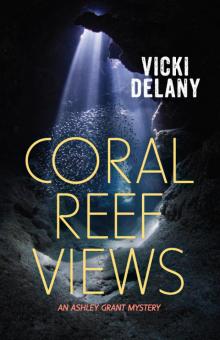 Coral Reef Views
Coral Reef Views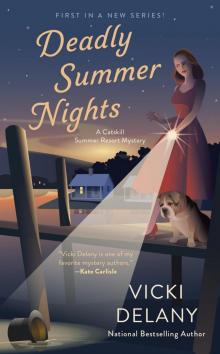 Deadly Summer Nights
Deadly Summer Nights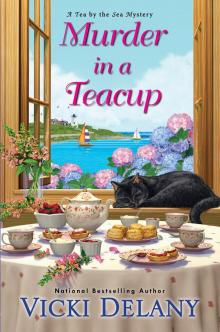 Murder in a Teacup
Murder in a Teacup Whiteout
Whiteout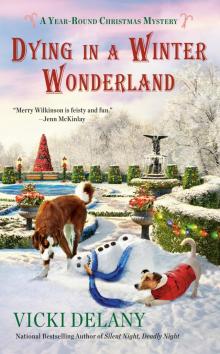 Dying in a Winter Wonderland
Dying in a Winter Wonderland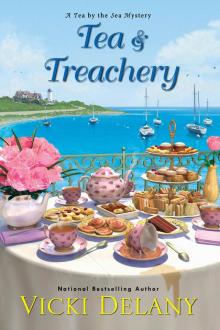 Tea & Treachery
Tea & Treachery Rest Ye Murdered Gentlemen
Rest Ye Murdered Gentlemen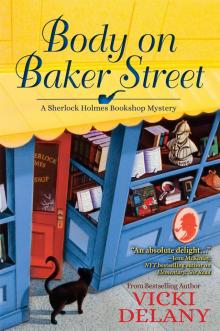 Body on Baker Street: A Sherlock Holmes Bookshop Mystery
Body on Baker Street: A Sherlock Holmes Bookshop Mystery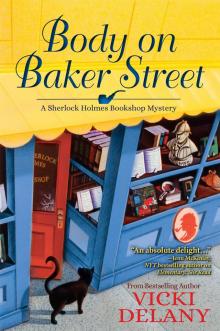 Body on Baker Street
Body on Baker Street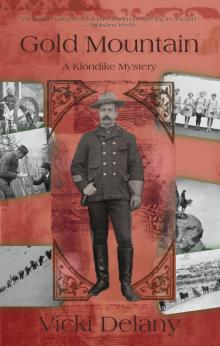 Gold Mountain
Gold Mountain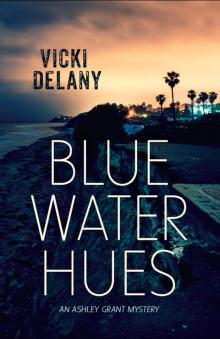 Blue Water Hues
Blue Water Hues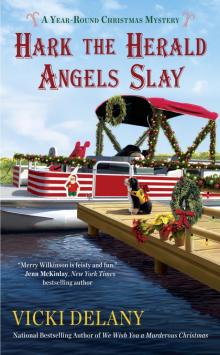 Hark the Herald Angels Slay
Hark the Herald Angels Slay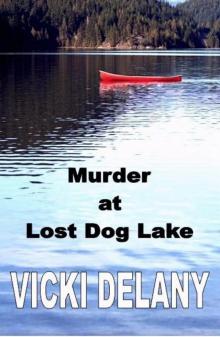 Murder at Lost Dog Lake
Murder at Lost Dog Lake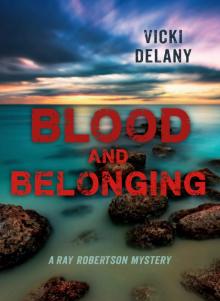 Blood and Belonging
Blood and Belonging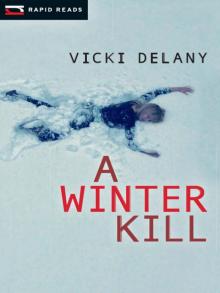 A Winter Kill
A Winter Kill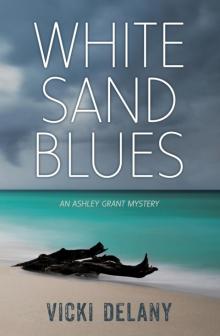 White Sand Blues
White Sand Blues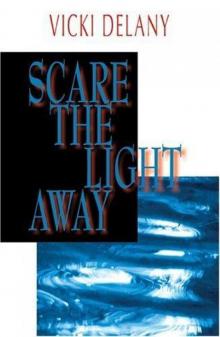 Scare the Light Away
Scare the Light Away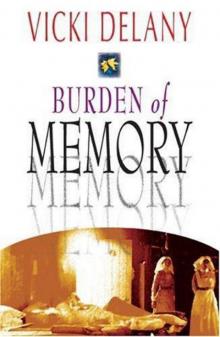 Burden of Memory
Burden of Memory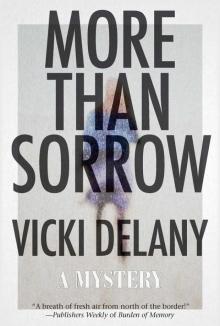 More Than Sorrow
More Than Sorrow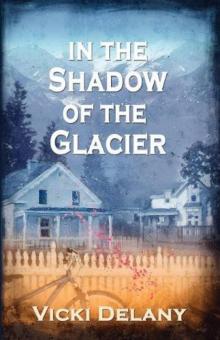 In the Shadow of the Glacier
In the Shadow of the Glacier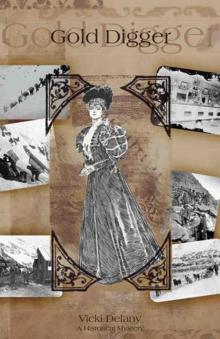 Gold Digger: A Klondike Mystery
Gold Digger: A Klondike Mystery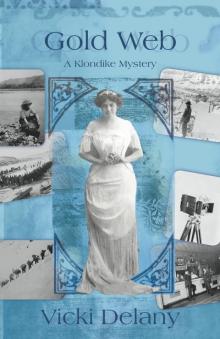 Gold Web
Gold Web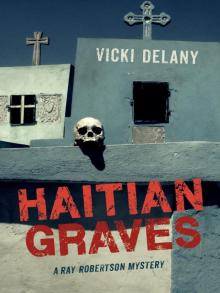 Haitian Graves
Haitian Graves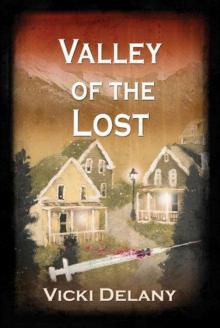 Valley of the Lost
Valley of the Lost We Wish You a Murderous Christmas
We Wish You a Murderous Christmas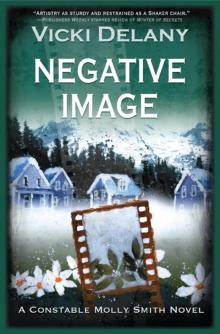 Negative Image
Negative Image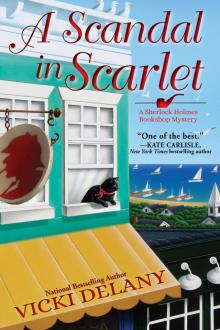 A Scandal in Scarlet
A Scandal in Scarlet Juba Good
Juba Good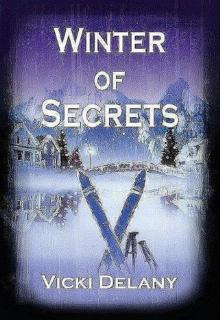 Winter of Secrets
Winter of Secrets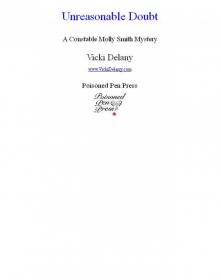 Unreasonable Doubt
Unreasonable Doubt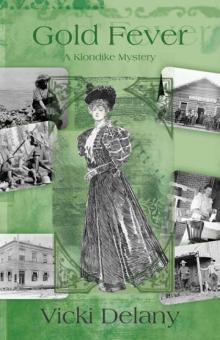 Gold Fever
Gold Fever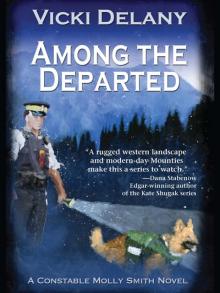 Among the Departed
Among the Departed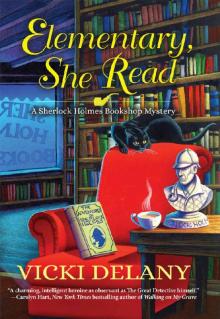 Elementary, She Read: A Sherlock Holmes Bookshop Mystery
Elementary, She Read: A Sherlock Holmes Bookshop Mystery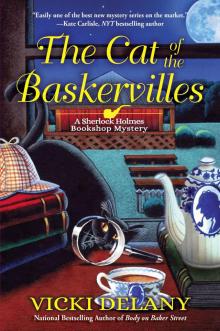 The Cat of the Baskervilles
The Cat of the Baskervilles